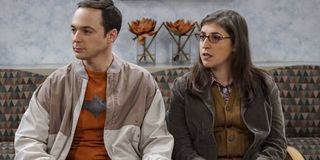Mayim Bialik Reveals Why The Big Bang Theory Doesn't Use Labels Like Autism Or OCD

The Big Bang Theory's characters have been delivering their unique personalities, relationships and behaviors to audiences for twelve years, with over 250 episodes. At no point during that time, though, have Sheldon or the others been given specific diagnoses or labels for their tics and quirks. That distinction is very important for star Mayim Bialik, whose neuroscience training puts her more in tune with psychiatric labels such as "autistic" and "depressed." Here's why Bialik says the show avoids that tactic.
The lack of labels used on our show is important for several reasons. First, it's not always important what we call things. For medical and clinical purposes, of course it is. But in life, and especially once we reach adulthood, we kind of are who we are. We have to hold down jobs. We make friends, or we don't. We find lovers. We pursue hobbies. We do the things we do to pass the days. We find joy and we experience loss. All of those things happen whether we have a label or not.
Mayim Bialik definitely has a point. It would be a rather odd occurrence if, say, Leonard and Penny became infatuated with pinpointing each of Sheldon's individual personality eccentricities for the sake of giving him a label. Plus, the show's comedic rhythms might get disrupted if these characters were suddenly really invested with getting to the bottom of each other's specific diagnoses.
As it goes in people's everyday lives when they hang out with friends or meet new people for the first time, conversations don't often hinge on slotting others into categories based on how they talk or act. (At least not to others' faces.) So it only makes sense for The Big Bang Theory's ensemble to also bypass such labeling.
In her blog post, Mayim Bialik continued, saying that the show is about characters accepting characters for themselves.
Second, our show focuses on people who live their lives as they are. Our show is about relationships and people. It's not about the things we do to make ourselves 'okay' for others. Sure, Sheldon annoys people. Sure, there are things we all wish we could change about others. But when it comes down to it, our show is about people living with others in acceptance of who they are and in spite of their peculiarities. The characters joke around with each other, and yes: sometimes directly say 'I don't like this about you.' But the answer on the show is never, 'Go take a pill.'
The Big Bang Theory star also points out that the sitcom depicts what life could be like if there weren't stigmas against getting help and talking about "weird" personality traits and behaviors. She wishes that real life's messy moments could resemble those faux situations more, but knows they cannot.
Mayim Bialik fully understands that almost all of the Big Bang Theory's major characters have quirks that would get them labelled quite quickly for medical reasons. She noted that Sheldon exhibits OCD signs, such as knocking three times on doors, and that his dedication to unique hobbies probably means he has a form of high-functioning autism. His various phobias, sensitive nature and high IQ are also factors here.
Here's how Mayim Bialik describes the rest of the Big Bang Theory's core bunch.
CINEMABLEND NEWSLETTER
Your Daily Blend of Entertainment News
Leonard is an anxious---and highly allergic---fellow with a ton of 'mommy issues,' as we used to fondly call them. Any psychologist would have a field day with Leonard. The same could be said of Koothrapali, who previously could not speak to women without alcohol in his system; Wolowitz, who had a Freudian attachment to his mother which even his mother was not entirely comfortable with; and Stuart, whose penchant for self-loathing and chronic depression is the basis for almost all of his plot lines. As for the ladies, Penny seems pretty untouched by psychiatric diagnoses. Bernadette has a mean streak and likes to lie, but it's kind of adorable the way our writers depict it. Amy is socially awkward, a bit sexually repressed, and anxious. I think she would fall on the autistic spectrum.
It's probably no coincidence that Penny was created without any huge personality quirks, considering she started off more or less as an attractive female for the guys to blushingly fawn over. But she's just about the only one without obvious psychiatric baggage.
As Bialik points out, co-creator and executive producer Bill Pardy had previously explained the show's lack of labelling in that respect. He said that the Sheldon's mother Mary never got him diagnosed, so the show won't either.
Do you guys think The Big Bang Theory's characters should be more open about their issues, or is it best to keep things on the down low, since the show is ending after this season? Let us know, and tune into CBS on Thursday nights at 8:00 p.m. to catch new episodes. (It's out this week, however.)
To see what new and familiar shows will be popping up soon, check out our fall TV premiere schedule and our midseason TV rundown.

Nick is a Cajun Country native and an Assistant Managing Editor with a focus on TV and features. His humble origin story with CinemaBlend began all the way back in the pre-streaming era, circa 2009, as a freelancing DVD reviewer and TV recapper. Nick leapfrogged over to the small screen to cover more and more television news and interviews, eventually taking over the section for the current era and covering topics like Yellowstone, The Walking Dead and horror. Born in Louisiana and currently living in Texas — Who Dat Nation over America’s Team all day, all night — Nick spent several years in the hospitality industry, and also worked as a 911 operator. If you ever happened to hear his music or read his comics/short stories, you have his sympathy.
Most Popular




